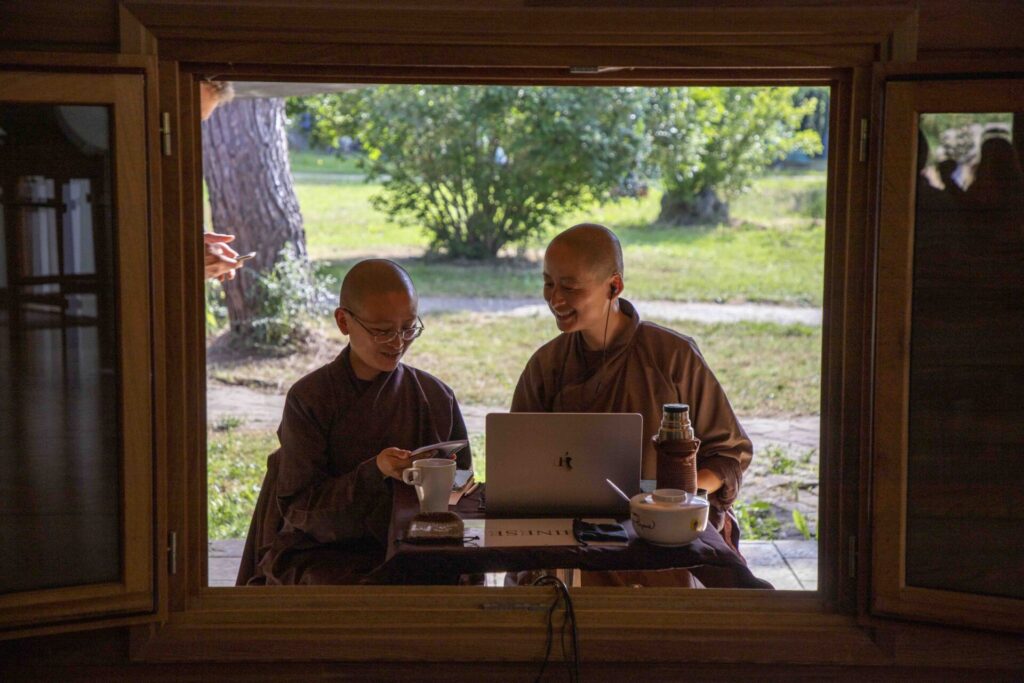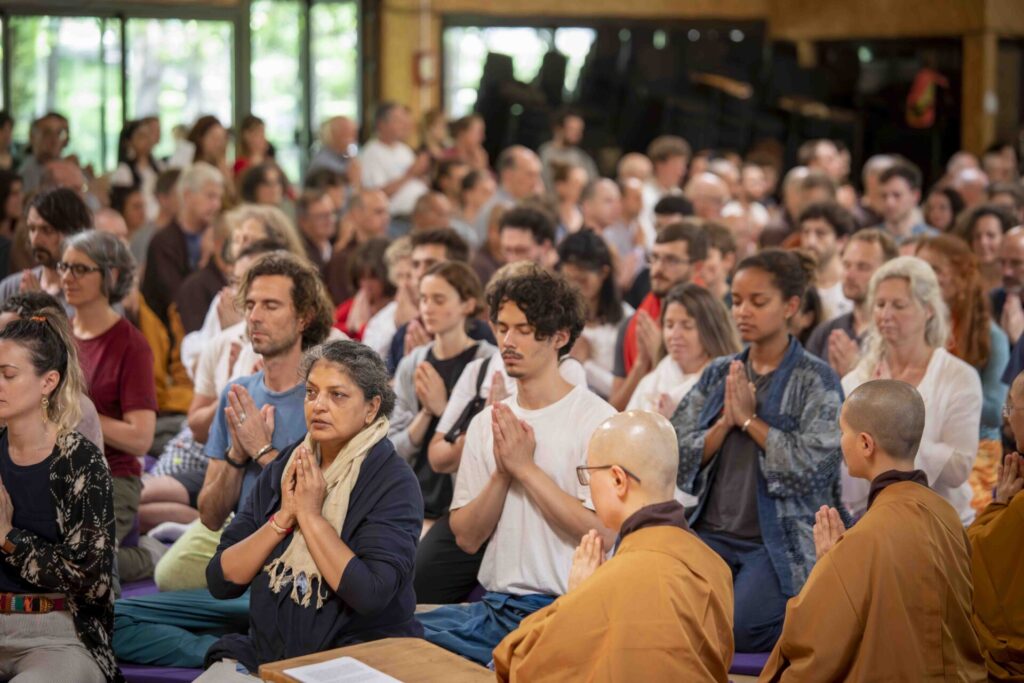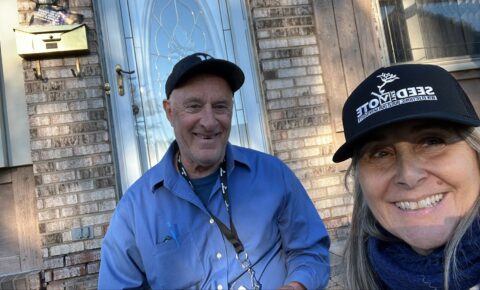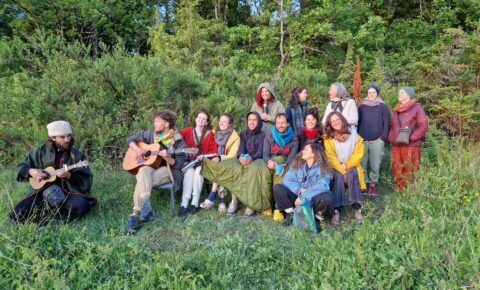Thay’s 2008-09 Teachings on Ethics – Talk 8 – Rains 2023/24
Dear friends, we continue our series on Ethics from the Rains Retreat, taught by Thay in 2008/9 in Vietnamese with English subtitles: Cut Off the Cycle of Violence: Compassionate Speaking and Deep Listening
The Path of Ten Good Actions Sutra
The Ten Precepts of the Path of Ten Good Actions Sutra are for everyone. Ten good actions means ten good deeds. Ten good actions path means the path of ten types of right actions, ten virtuous actions.
Within these ten precepts, there are three precepts related to the body, three precepts related to the mind, and four precepts related to speech. The three precepts related to the body are: no killing, no stealing, no sexual misconduct. These belong to the body.
There are three precepts related to the mind. Which are: not being greedy, not having a temper, and not being deluded.
The remaining four precepts are related to speech. Which are: not lying (không nói dối), engaging in false speech (vọng ngữ), not engaging in exaggerating speech (ỷ ngữ). Not engaging in divisive speech (Lưỡng thiệt) Lưỡng thiệt means speaking with a Double tongue. And the last precept related to speech is not to speak cruelly (không ác khẩu).
Cruel speech means saying hurtful, abusive or insulting, condemning words to others. That is cruel. This is called cruel speech (ác khẩu).
In the Path of Ten Good Actions Sutra, there are four precepts related to speech. And we can see that speech plays a very significant role because we can create a lot of suffering through our speech.
We can also create a lot of happiness through our speech. Just by using skilfull speech, we can bring happiness to many people, no need to spend money. And this is a training. If we want to practice right speech, we have to practice refraining from false speech, suggestive speech, divisive speech and harsh speech.

Speaking The Truth is an Art
False speech, first of all is not lying, not speaking untruthfully. But in daily life, sometimes when we speak the truth, it makes others unhappy, it makes them suffer. “The truth hurts.” And when speaking the truth, if it is not done skillfully, the other person may suffer, become disheartened, and could even commit suicide. So, telling the truth is not always a good thing. To tell the truth we must know how to speak.
We must find a way to speak the truth that is beneficial for others, for the world, and for ourselves.
It’s not that we should always speak the truth carelessly, because it can cause more harm than not speaking. Sometimes we say, “I just speak the truth.” But after saying the truth, there is suffering, there is despair, there is division. Therefore, we must be skillful in our speech even if we are speaking the truth.
Speaking the truth is a principle, but it has to be done in a way that doesn’t cause suffering. And to do it like that is an art
We can only do it by practicing. So when we say, “I just speak the truth,” that is a fact, but we are not skillful, and we cause suffering. So from now on, don’t say, “I just speak the truth”. We need to speak with compassion, we need to speak in a way that the other person can accept, learn from, and recognize their own mistakes.’’ Therefore, we need to use loving speech, wholesome speech.

Mindful Journalism
On the occasion of the 150th birthday of Mahatma Gandhi, The Times of India knew that I was in New Delhi, so they invited me to take care of the Peace Edition of The Times of India. When I sat with the editors of the newspaper, there was news that some bombings had just happened. Violence, terrorism. And the editor-in-chief said,
“Dear Thay, on a day like today, when we receive so many bad news stories like this, as journalists, as newspaper editors, what should we do?” Because good news is very scarce, but bad news is abundant. And bad news, first of all, shakes the reporters. When the reporters are shaken, they become desperate, fearful, and angry, then those reporters will write news articles that can sow the seeds of fear, anger, and frustration in the readers.
So, the question from the editor-in-chief is very pertinent, “Thay, on a day when we continuously receive such bad news, what should we do as journalists?’’ When I was asked that question, I sat still and breathed. And there was silence. Everyone remained silent, waiting while I breathed. After taking three breaths, I said:
We have to tell the truth, we need to report what really happened in such a way that doesn’t sow the seeds of fear, hatred, anger, and despair in the readers. Have compassion for them!
So we need to sit, as journalists we need to sit and contemplate, We can ask ourselves, “why did people bomb like that? When they commit such acts of terrorism, what was their state of mind, how much suffering did they encounter to cause them to do such things?” we contemplate in this way. And after contemplating deeply, we will be able to see that the bombers, the terrorists might have distorted perceptions. They might have a lot of hatred, wrong perceptions and wrong beliefs, such as after bombing and killing their enemies, they would immediately go to heaven. Perhaps they have such beliefs.
When we are able to contemplate as such, we could clearly see that these terrorists are also victims of their own anger, despair, and wrong perceptions. That way, in our heart, we don’t give rise to hatred or blame towards them. Instead, compassion is born in our heart. We want to find a way to help them not become victims of their own resentment, anger, and despair, so that they don’t commit such acts in the future. Because right now, there are terrorists, who will use their death to promote hatred in the future.
Then those who are not terrorists right now, will read news filled with hatred, anger, they might become prospective terrorists. That way, this cycle of terrorism will continue. Therefore while reporting on ongoing events, we must find a way to water the seeds of compassion and understanding in readers. We should not water the seeds of hatred, worry, fear, and despair within them. Have compassion for them. They suffer, and some of them might despair and become terrorists themselves.
I remembered that sharing was like a short Dharma talk, and all the editors were listening very attentively. ‘’The issue is not about concealing the truth, we have to tell the truth, but we need to convey the truth in a way so that people do not become victims of despair or hatred.’’
To do that, one must contemplate with a compassionate heart and insight. That is the duty of a journalist. Usually when journalists come to interview me, I talk to them and water their good seeds, encouraging them to use their writing skills to write stories and commentaries that are capable of watering seeds of love and understanding in their readers.
This is my approach. Every time a journalist comes to interview me, I try to have a conversation with them that feels more like human to human. Many times, I have inspired journalists. I tell them,
You can become a Bodhisattva, alleviating suffering for others. If you know how to write stories and commentaries that can water seeds of understanding and compassion in the hearts of your readers.
The Fourth Mindfulness Trainings
The fourth of the Five Mindfulness Trainings, even though it talks about verbal karma and speech, is paired with listening. On one side, there is the ear, on the other side, there is the mouth. The mouth is for speaking, and the ear is for listening. In the fourth training we are practicing loving speech, paired with deep listening. Deep listening with compassion.
When we have the capacity to listen with compassion, we understand and feel the suffering and pain of others. As a result, we become calm and tranquil, and compassion is born in our hearts. Thus loving speech becomes effortless. That’s why listening must go together with loving speech.
Listening is a form of deep looking. Deep looking is not just through the eyes, it must involve the ears as well.
Looking deeply through the eyes allows us to see the suffering and pain. Using our ears to listen also enables us to see the suffering and pain of others. Both are referred to as contemplation. “Looking deeply”, ”listening deeply to the sounds of the world”. Quán thế âm means listening deeply to the sounds (of life).
When we use our eyes and ears to contemplate, we can see the suffering and pain of others, and suddenly compassion fills our hearts. We are capable of using loving speech. I am determined to look deeply in order to see the suffering and difficulties of the other person, so that I am able to easily apply loving speech and deep listening to help remove their misunderstandings in order to bring about reconciliation. Bring about reconciliation within friends, couples, families, communities, nations, and society. To build sangha, and lay the foundation for the practice of many people.

Thay goes on to speak about the four ways of investigation, letting go of the label to be in touch with the truth and the wisdom of non discrimination.






